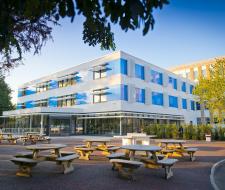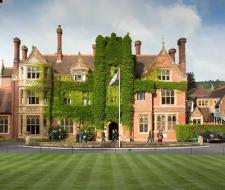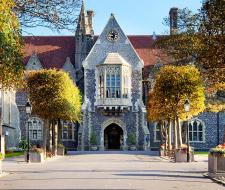Hockey in England UK 2026
-
 "5th Highest Performing School by A Level results in 2023" – The Telegraph.
"5th Highest Performing School by A Level results in 2023" – The Telegraph. United KingdomYorkCurrently watching: 10from 13850.00 £ / term
United KingdomYorkCurrently watching: 10from 13850.00 £ / term -
 In 2022 - 66% of A Level students achieved A* - A
In 2022 - 66% of A Level students achieved A* - A United KingdomOxfordCurrently watching: 7from 15100.00 £ / term
United KingdomOxfordCurrently watching: 7from 15100.00 £ / term -
 75% of our A-Level students achieved A*-A in 2022
75% of our A-Level students achieved A*-A in 2022 United KingdomCanterburyCurrently watching: 8from 11450.00 £ / term
United KingdomCanterburyCurrently watching: 8from 11450.00 £ / term -
 In 2023 - 98% pupils gained places at their first choice University
In 2023 - 98% pupils gained places at their first choice University United KingdomCambridgeCurrently watching: 6from 14320.00 £ / term
United KingdomCambridgeCurrently watching: 6from 14320.00 £ / term -
 In 2023 results either for IB (32) and A Level (46% - A*-B) are higher than UK average
In 2023 results either for IB (32) and A Level (46% - A*-B) are higher than UK average United Kingdomnear LondonCurrently watching: 7from 13000.00 £ / term
United Kingdomnear LondonCurrently watching: 7from 13000.00 £ / term -
 In 2020 - 70.5% of A Level students achieved A* - A
In 2020 - 70.5% of A Level students achieved A* - A United KingdomCoventryCurrently watching: 10from 12818.00 £ / term
United KingdomCoventryCurrently watching: 10from 12818.00 £ / term -
 The highest ranked co-educational school in the United Kingdom in 2021
The highest ranked co-educational school in the United Kingdom in 2021 United KingdomBrightonCurrently watching: 10from 16740.00 £ / term
United KingdomBrightonCurrently watching: 10from 16740.00 £ / term -
 In 2023 results either for IB (33) and A Level (73% - A*-C) are higher than UK average
In 2023 results either for IB (33) and A Level (73% - A*-C) are higher than UK average United KingdomBristolCurrently watching: 7from 10100.00 £ / term
United KingdomBristolCurrently watching: 7from 10100.00 £ / term -
 In 2023, in University Foundation Programme 50% of students achieved an A*- A
In 2023, in University Foundation Programme 50% of students achieved an A*- A United KingdomLondonCurrently watching: 6from 11450.00 £ / term
United KingdomLondonCurrently watching: 6from 11450.00 £ / term -
 In 2021 - 85% of A Level students achieved A* - B
In 2021 - 85% of A Level students achieved A* - B United KingdomLiverpoolCurrently watching: 9from 11500.00 £ / term
United KingdomLiverpoolCurrently watching: 9from 11500.00 £ / term
Hockey camps, academies and schools in England are places for players of all levels, from beginners to professionals. You or your child can only engage in sports training or add intensive English to the hockey track to improve their language level.
Hockey training in the UK helps young talent reach their potential through active, productive and regular training (usually from 30 hours per week). We will tell you more about the rest of the benefits of sports programs and about the best hockey camps in England, academies and schools below.
Alternative destinations
Features of studying in sports programs in England
Like other educational institutions, hockey camps, academies and schools have their own training features:
- The priority for hockey team coaches is the development of physical and technical improvement of players, so the main emphasis in training is on basic skills and theoretical knowledge of the game. In addition, complex elements, individual characteristics of hockey players, problem areas are worked out.
- To hone their skills, athletes have not only training, but also friendly matches, city and regional competitions.
- If an athlete has chosen an intensive hockey course, has experience in the game and wants to develop further, then coaches add video footage of training sessions to the classic elements of training for further analysis. They can, among other things, watch the games of championship hockey teams to study their technique, strategy and tactics.
- A hockey camp for children in England is a place where a novice athlete learns not just to play, but to understand the game and his role in it. Coaches teach young hockey players the skills of analysis and planning in order to understand their own shortcomings and strengths, quickly react during the game to the actions of opponents and their teammates, and be able to set their own sports goals for the game season.
- Qualified employees accredited by FIH and EHA, for example, always act as trainers. Many teachers have international and Olympic work experience, which strengthens their professional skills, which they pass on to the next generations of hockey players.
- Proper nutrition is one of the keys to the successful development of an athlete, so the staff of camps, academies and schools carefully monitor this. Usually, young hockey players eat three meals a day: breakfast, lunch and dinner + healthy snacks. All meals are specially tested for quality and compliance with balanced diets so that athletes get energy for training and do not overeat.
There are many hockey-related institutions for foreign athletes to choose from: hockey camps for teenagers in the UK, children's courses, professional academies, and schools. Usually, students train in parallel in the same team, but some institutions also offer individual lessons, where the coach stays one-on-one with the student and pays all attention to him. On average, students in general sports programs have:
- from 15 workouts per week,
- from 15 hours of English per week,
- the ratio of coaches to players is 1:10,
- branded uniforms and individual inventory,
- a place in the residence for a comfortable stay,
- round-the-clock support from trainers and tutors,
- final certificate of attendance,
- leisure activities: excursions, cinema, free hours, etc.
How much does it cost to enter the best hockey schools in England, camps and academies
Hockey Academies and Schools:
- £5000-20,000 + cost annual programs, which usually include training, accommodation and meals.
Hockey Camps:
- £500-2000 per week (on average, such courses last up to two weeks); The price usually includes all services: meals, accommodation and training.
- Up to £3000 per week can be the cost of intensive programs or thematic areas (for example, for goalkeepers or a camp with active excursions to famous stadiums and clubs).
Requirements for foreigners to enter hockey academies in England, camps and schools
Sports courses in England give preference to players who already have experience and plan to get into big sports, build a career in hockey, but ordinary sports fans in the UK are also welcome and supported. To get into one of the sports programs, a foreign hockey player must take into account the following criteria:
- Age restrictions: Most academies, camps and schools have a differentiation by specific age groups, usually accepting players from 8 to 18 years old.
- Level of athletic training. Some programs require a hockey player to have experience playing professionally, and sometimes the criteria for selecting students are minimal. Academies and schools often hold special selections, where young hockey players take part in tournaments and games with other potential students.
- Language skills: since all training sessions are held in English, the athlete must understand and know the basic game terms and formulations in a foreign language. Sometimes camps, schools and academies ask for language test results, but this is more typical for year-round full-cycle academies.
- Visa: All foreigners need permission to enter and study in the UK.
- Financial and insurance security: in order to enter the UK, the family of a foreign hockey player needs to prove their financial solvency and take out medical insurance in case of injuries and illnesses related to training.
